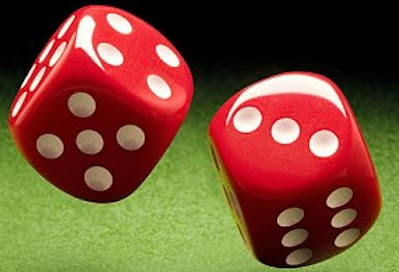No one who's read this blog for very long should be surprised by this. I am, after all, a huge proponent of the oracular power of dice, as well as the belief that "gamey-ness" is no less important to what makes an RPG an RPG than its "roleplaying." This is a big part of why I'm opposed to any definition of roleplaying games that likens them to an activity of "collaborative storytelling," unless that definition also includes collaboration with random elements. Without some degree of randomness – including the concomitant possibility of failure – my level of interest diminishes (and I say this as someone whose ongoing Empire of the Petal Throne campaign often goes weeks without a single die roll).
I was reminded of my feelings about this during a recent session of the Barrett's Raiders Twilight: 2000 campaign I began in December of last year. The characters are currently in the process of exfiltrating the Free City of Kraków, which they have come to realize is a nest of vipers liable to get them all killed. However, one of the characters, a CIA field agent who'd been posing as a Polish civilian prior to the outbreak of the war, recently received information that suggests an important contact is being held captive in an abandoned farmhouse northwest of the city. Since his captors were likely Soviet agents, the character felt an obligation to rescue his contact or, failing that, to ensure he didn't divulge operational secrets to the enemy.
To that end, he and one of the other player characters set off, under cover night, to the location of the farmhouse. The farmhouse was surrounded on one side by a copse of trees that his player felt would provide excellent cover, especially in the dark. What the player didn't know was that the same copse of trees was being used by a Soviet lookout. Thus, when the character and his companion (another PC) entered the copse, I called for a Recon skill roll, this being the skill used in Twilight: 2000 for determining, among other things, if a character can successfully travel through an area without being seen.
The dice were in the characters' favor that day – so much so, in fact, that they not only succeeded in not revealing themselves to the hidden lookout, but they also succeeded in spotting him. Armed with this knowledge, they decided that discretion was the better part of valor and retreated back in the direction they came. Of course, events could have just as easily gone badly for them, in which case they'd likely have alerted not simply the lookout but the other Soviets patrolling the grounds of the farm. In that event, there's a very good chance that the player characters would have been badly wounded, if not captured or killed, since they were outnumbered and outgunned.
I found this tiny moment in the session quite thrilling, as did the players involved. Though they didn't realize it at the moment I called for a skill roll, a lot hung on the results of that throw of the dice. Indeed, the entire course of the next session, which involved a planned raid on the farmhouse, might have gone completely differently had the characters failed that Recon roll. This is precisely why I so value randomness in RPGs: you can never be sure what will happen next. The entire course of my House of Worms campaign was altered by a single failed saving throw, for example. Indeed, many of my fondest memories of playing roleplaying games include unexpected moments occasioned by the results of a single roll of the dice.
I can't speak for anyone else, but that's how it should be.


That second paragraph could have come out of my own mouth. I try not to let it get me down, but I always feel a little disappointed when I read in the opening pages of some new game that an RPG *is* a "collaborative storytelling experience". Sure, that's one element, but that isn't what an RPG *is*.
ReplyDeleteI emphatically agree!
ReplyDeleteIt is for this same reason that I often roll randomly to determine magic items as treasure. It's thrilling to give up control over an aspect of the game. A recent campaign saw the party take possession of a (randomly rolled) Immovable Rod, which everyone laughed at and no one wanted...yet it proved to be eminently useful, and several times was the difference between success and death.
ReplyDeleteI agree with your words. The random element is what attracts me to rpg, though I'm not sure why that is.
ReplyDeleteIt should be random wherever and whenever possible. That's the old school way. DnD 5e just seems very rail road in story approach, encounters, etc.
ReplyDeleteTo this day my group of gaming friends from high school still sings of the time, decades ago, when my character made an epic escape from certain death from an invading army thanks to the dice. Trapped by a heavy iron grate at the end of a tunnel under the castle as hundreds of orcs and gnolls poured around the corner, my 1st level guy was given a 4% chance to bend the bars — which I did, slipping through to the other side.
ReplyDelete"Congrats" cackled the DM, "you've just created a hole in the castle's defenses for the enemy!" "Fine," I said with elan of someone with nothing left to lose, "I'll just bend them back" — and proceeded to roll an 01. A legend was born.
yeah
ReplyDelete